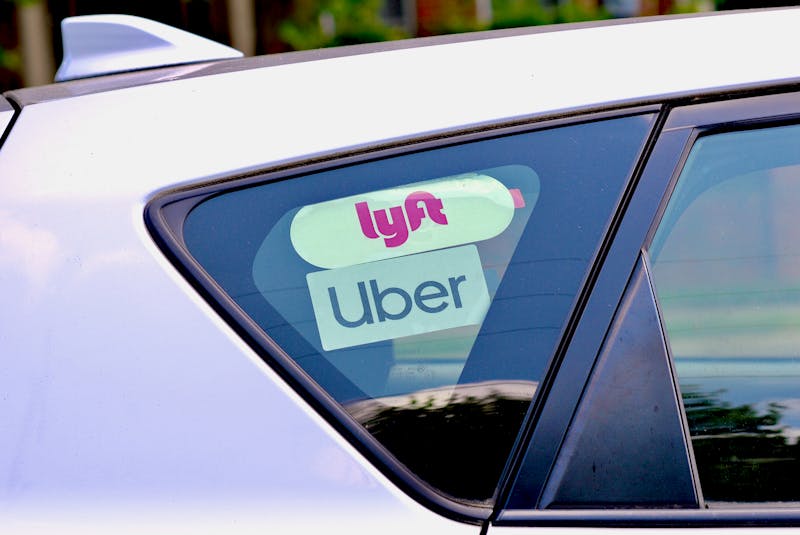Get a Free Consultation
2 minute response
24 hours a day, 7 Days a Week
Dedicated Trust Guss Intake Team

Rideshare apps like Uber and Lyft have changed how we get around. But when accidents happen, figuring out who’s responsible can be overwhelming. Was it the driver’s fault? The company’s? Another vehicle’s? What about insurance? If you’ve been injured in an Uber or Lyft crash, either as a passenger, pedestrian, or in another vehicle, you may be facing questions about insurance, liability, and what comes next. Trust Guss Injury Lawyers can help you understand your rights and explore your legal options.
The answer to “Who’s responsible?” isn’t always obvious in a rideshare crash. In fact, it often depends on a few factors:
These details impact who may be financially responsible for your medical expenses, income losses, and other damages. And unfortunately, both Uber and Lyft often try to distance themselves from responsibility.
In Texas, rideshare drivers are classified as independent contractors—not employees of Uber or Lyft. This classification matters because it limits when the rideshare platform can be held responsible for accidents.
Under Texas Occupations Code § 1954, Uber and Lyft generally aren’t liable for accidents unless they occur during specific app phases where company insurance is active. When the app is off, the driver’s personal insurance applies.
Still, there are exceptions. If Uber or Lyft failed to screen a driver properly, ignored red flags, or exercised too much control over a driver’s work, the platform could face direct liability.
Uber and Lyft don’t operate like traditional transportation companies. Instead, they rely on tiered insurance coverage that activates in phases based on the driver's app status:
If the app is off and the driver is using the vehicle for personal errands, only the driver’s personal auto insurance applies. Neither Uber nor Lyft will provide coverage during this time.
Once the driver activates the app but hasn’t yet accepted a ride, contingent liability coverage applies. Uber and Lyft offer:
But this only kicks in if the driver’s personal policy doesn’t cover the crash.
Once a ride is accepted or underway, $1 million in commercial liability coverage applies. This includes:
This is the most comprehensive phase of coverage and often plays a significant role in rideshare injury cases.
Responsibility for an Uber or Lyft accident can fall on multiple parties—and in many cases, more than one person or company shares the blame. Understanding each potential source of liability is key to building a strong legal claim.
If the Uber or Lyft driver caused the crash through negligence—such as distracted driving, speeding, or running a red light—they may be held personally liable. Their actions are judged under Texas negligence law, which requires drivers to operate vehicles with reasonable care.
Uber or Lyft could also be held responsible if they contributed to unsafe conditions. This might include failing to remove a dangerous driver from the platform or maintaining policies that encourage risky driving behavior. If the company exercises enough control over the situation, its liability protections may not apply.
Rideshare crashes often involve other vehicles. If a separate driver caused the collision—by swerving, rear-ending the rideshare car, or ignoring traffic laws—they may be held liable for your injuries and property damage.
Sometimes the cause of a crash isn’t a person, but a mechanical failure. If a defective part—like faulty brakes, tires, or steering components—contributed to the crash, the manufacturer or a negligent mechanic may be responsible.
These cases are rarely simple. A complete investigation is often necessary to determine exactly what caused the crash and which parties should be held financially accountable. At Trust Guss Injury Lawyers, we move quickly to gather the evidence needed to protect your rights. If you’ve been injured in a Texas Uber or Lyft accident, reach out for a free consultation. Our team is available 24/7, and you won’t owe legal fees unless we’re able to recover compensation for your case.
The following situations show how multiple layers of liability and insurance can apply. Your lawyer’s job is to identify all potential sources of recovery and pursue them aggressively.
Under Texas law, most victims have two years from the date of the crash to file a lawsuit. That includes accidents involving Uber or Lyft. The deadline may be extended in certain situations, like when a victim is a minor or when injuries are discovered later.
Because these deadlines are strict and rideshare evidence like trip logs can be lost, it’s important to act quickly. Don’t wait to protect your claim. Call Trust Guss Injury Lawyers at 888-298-4070 or contact us online today so we can begin building your case.
At Trust Guss Injury Lawyers, we know how quickly a rideshare crash can turn your life upside down. That’s why we handle the legal legwork so you can focus on recovery—and we don’t back down from big-name companies or their insurers. When you choose us, you get:
Rideshare accidents require a careful strategy. We work quickly to secure critical trip data, determine which insurance phase applies, and identify every potential source of compensation. Our team has the experience to deal directly with Uber and Lyft’s insurance companies, counter their tactics, and pursue fair settlements. When necessary, we’re prepared to take your case to trial to protect your rights.
Uber and Lyft accident claims can be confusing, but you don’t have to go through it alone. Trust Guss Injury Lawyers has experience handling these complex cases and the commitment to pursue fair compensation for your injuries.
We guide you through each stage of the legal process—from investigation to negotiation to resolution. If you’ve been injured in a Texas rideshare accident, call 888-298-4070 or contact us online for your free consultation. We’re ready to help 24/7.
2 minute response
24 hours a day, 7 Days a Week
Dedicated Trust Guss Intake Team